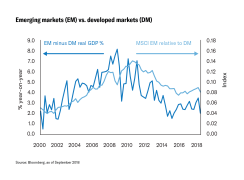While there are short-term challenges in emerging markets as a function of trade war concerns, political problems, a stronger U.S. dollar and rising U.S. interest rates, we believe they offer tremendous investment opportunities in the longer term.
Increasingly diverse emerging markets are making an ever greater contribution to global growth. And that trend is set to persist over the medium to long term.

We are also seeing material changes taking place at the underlying development stage in many emerging markets, with much of that being facilitated by technology. For example, hundreds of millions of people are now getting their first smartphone. This small piece of hardware – something we take for granted in the developed world – has the scope to unlock a host of new opportunities, from healthcare and education to applications that help small businesses increase their productivity and profitability on a day-to-day basis.
Demographics drive growth at macro level
At the macro level, we are also seeing demographics as a significant driver of growth across many economies. Here, the prospects are most compelling in those countries where the largest proportion of the population is at its most productive age. It is interesting to observe, for example, that Mexico has reached the same production-age sweet spot that Japan did in 1970.
Another important trend to note is urbanization. With millions migrating to cities across the emerging markets, infrastructure spending is likely to be a major driver of secular growth.
Our long-term growth outlook for emerging markets remains favorable, notwithstanding the inevitable short-term challenges along the way. However, rather than investing in emerging markets directly, in many instances it may be better to play that growth dynamic through developed market exposure and companies that export products to emerging markets to take advantage of growth and consumption in those areas.
There is, nevertheless, a tremendous opportunity for governance improvements to make emerging markets more resilient to financial downturns, while enhancing the efficiency of their stock markets. Authorities have recognized the importance of good corporate governance to attract investment flows, spearheading reforms that aim to tackle the risks associated with ownership by founders and governments, poor disclosure, and weak protection mechanisms for minority shareholders. At the same time, governance is improving, particularly in Asia, to a large extent in response to companies’ increasing appetite to engage with, and learn from, investors.
The impacts of global changes shaping society, including technology, population growth, and climate change, will be disproportionately felt across the developing world. The long-term success of companies in these countries, therefore, hinges on their ability to integrate these and other pressing environmental and social issues pertinent to their businesses into strategic decision making. We support the effort that companies have made to think more holistically about sustainable growth, including their impacts on the environment and society. As active stewards of capital, we will continue to engage with them to improve their overall approach to managing environmental, social, and governance (ESG) risks and opportunities and, in the process, help protect and enhance shareholder returns.
To access the full report from the Forum, please visit bmogamviewpoints.com.
All investments involve risk, including the possible loss of principal. The value of and income from any investment can fall as well as rise, and may be affected by changes in currency rates of exchange or taxation. An investor may not get back the original amount invested.
BMO Global Asset Management is the brand name for various affiliated entities of BMO Financial Group that provide investment management and trust and custody services. Certain of the products and services offered under the brand name BMO Global Asset Management are designed specifically for various categories of investors in a number of different countries and regions and may not be available to all investors. Products and services are only offered to such investors in those countries and regions in accordance with applicable laws and regulations. BMO Financial Group is a service mark of Bank of Montreal (BMO).
Investing internationally, especially emerging markets, involves additional risks such as currency, political, accounting, economic, and market risk.
Investment products are: Not a Deposit — Not FDIC Insured — No Bank Guarantee — May Lose Value.
Copyright© 2018. BMO Financial Corp. All Rights Reserved.






